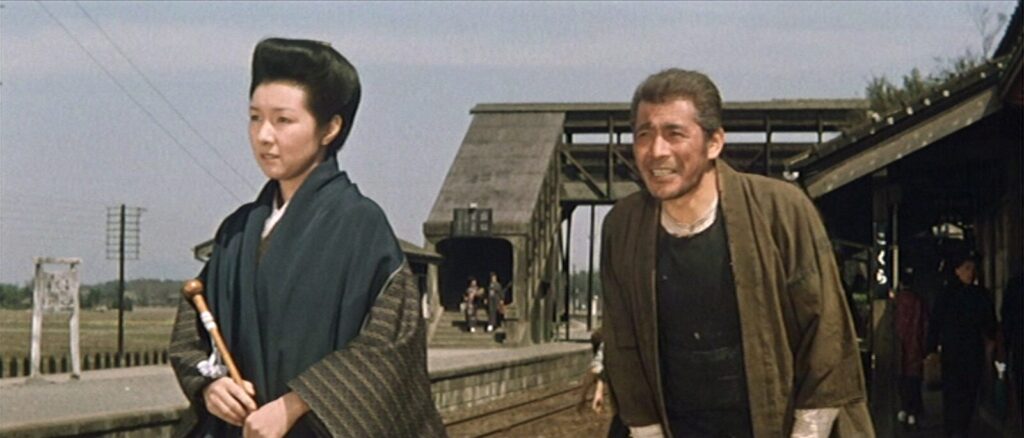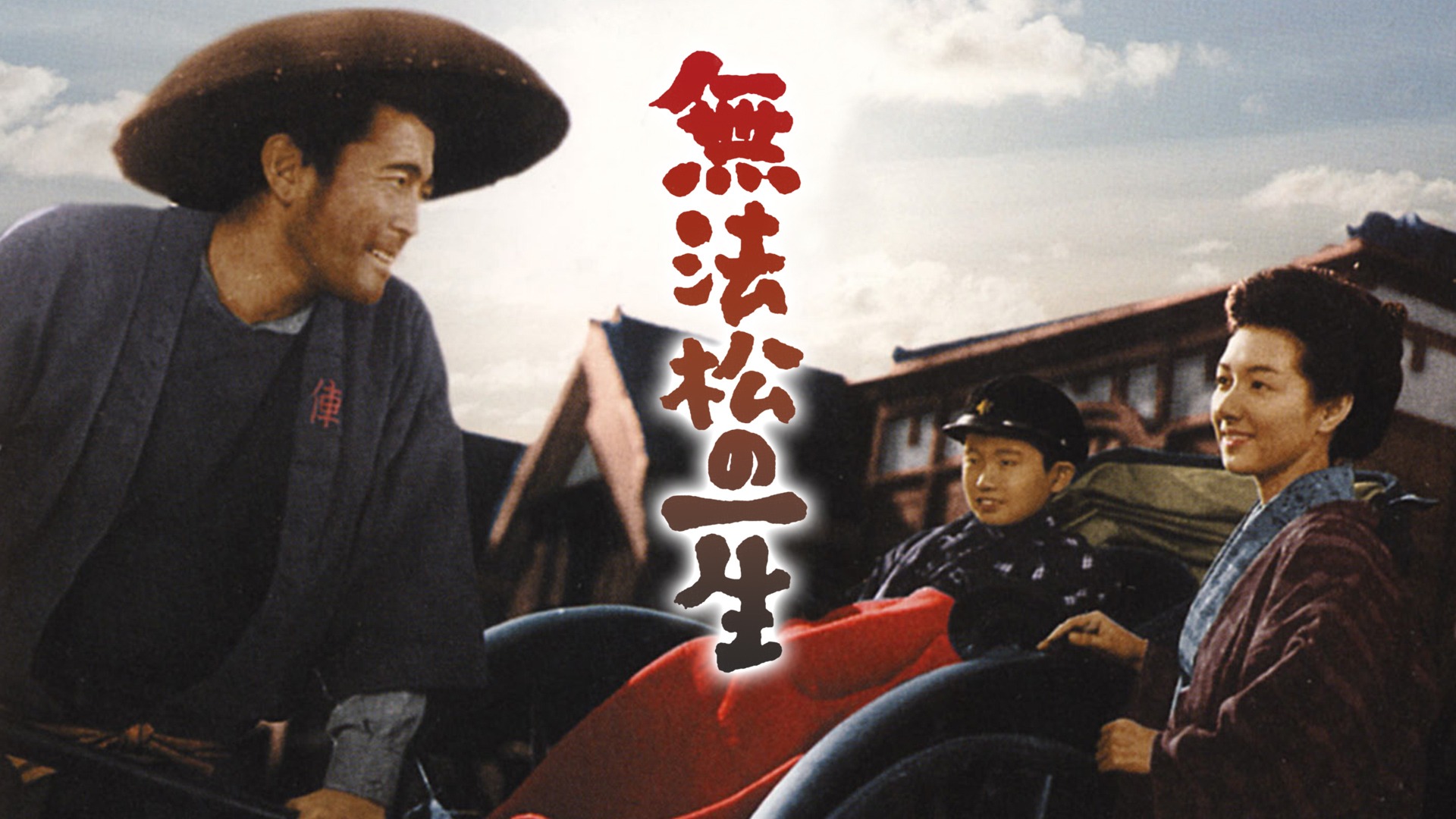Released in 1958 and starring Toshiro Mifune, Hiroshi Inagaki’s “Muhomatsu no Issho” (The Rickshaw Man) is a deeply moving film that leaves a lasting impression. Set in Kokura, Kyushu, during the Meiji era, it tells the story of Matsugoro (Toshiro Mifune), a rough but warm-hearted man who, through encounters with others, gains kindness and moves people with his inherent goodness, dedicating his life to a family he meets. The film’s enduring appeal lies in its universal themes, Mifune’s powerful performance, and its splendid score and visual transitions.
Film Overview
This film garnered significant international acclaim, including the Golden Lion at the 19th Venice International Film Festival. Notably, it’s a self-remake by director Hiroshi Inagaki, who also directed the original “Muhomatsu no Issho” in 1943 (Showa 18). Inagaki is said to have poured his regret over unfulfilled expressions from the previous version into this remake. The film’s backdrop features scenes celebrating victories from wars like the Russo-Japanese War and the Battle of Tsingtao, illustrating a time when Japan was confident and assertive in its military endeavors.
[Synopsis] In late Meiji-era Kokura, Matsugoro, a rickshaw man known as “Muhomatsu” (Wild Matsu) to the townspeople, is a rough but somehow lovable character. One day, he helps Toshio, the son of Army Captain Yoshioka, who has fallen from a tree and injured himself. Through this encounter, Matsugoro becomes acquainted with the Yoshioka family. After Captain Yoshioka’s sudden death, Matsugoro decides to support the widowed Mrs. Yoshioka (Hideko Takamine) and young Toshio. Matsugoro becomes a father figure to Toshio, who has lost his own father, raising him with strict yet warm affection. Meanwhile, he harbors a secret love for the widow, a love he never expresses, as he continues to support their lives from the shadows. As Toshio grows and the times change, a complex relationship, at times warm and at times poignant, develops between Matsugoro and the Yoshioka family.
Matsugoro’s “Devoted Love”
At the heart of the story is Matsugoro’s secret love for the widowed Mrs. Yoshioka (Hideko Takamine) and his deep affection for her young son, “Bonbon.” He silently and tirelessly dedicates himself to the family. This devoted love, seeking no reward and solely wishing for their happiness, deeply resonates with viewers.
Despite his profound feelings for Mrs. Yoshioka, Matsugoro is constantly held back by the difference in their social statuses and his own rough demeanor. This makes his unrequited love all the more poignant. His understated expressions of affection, contrasting with the more direct communication styles of today, evoke profound emotion.

The Aesthetics of “Manhood” and Universal Human Nature
The portrayal of “manhood” in this film might seem old-fashioned by contemporary standards. Matsugoro’s self-sacrificing nature, his preference for action over words, and his unwavering dedication differ from modern emphasis on self-expression.
However, beneath this depiction of “manhood” lie universal virtues that transcend time:
- Pure Devotion: A heart that wishes for others’ happiness without expecting anything in return.
- Strong Sense of Responsibility: A commitment to giving one’s all once a task is undertaken.
- Human Warmth: A gentle kindness that emerges from his rough exterior.
These are fundamental human qualities that people across generations value. Matsugoro’s way of life powerfully embodies these timeless virtues.
Toshiro Mifune’s Masterful Performance: Etching Matsugoro’s Soul
One of the most memorable moments in the film is when the grown-up “Bonbon” asks Matsugoro not to call him “Bonbon” anymore. Mifune’s portrayal of Matsugoro’s heartbreakingly wounded expression—a mix of sadness and deep hurt after his affectionate term is rejected—is a testament to his acting genius. His remarkable aged makeup further enhances his immersion in the role.
This scene isn’t just about a rebuke; it’s a moment when Matsugoro is confronted with the shifting distance from the boy he raised and the invisible barrier between himself and the family. He senses a deep anxiety that the “family” who once needed him might drift away as the boy matures.
The expression encapsulates his profound resignation and loneliness: “After all, our statuses are different,” and “Ultimately, I am an outsider.” The reality that he can never truly be “family,” no matter how much he dedicates himself, highlights the tragic beauty of his devotion and solitude.
Another iconic scene in the film is the Gion Drum performance. Mifune’s skill and power, combined with the flowing camera work that follows the drum’s rhythm, are breathtaking. It vividly expresses Matsugoro’s overflowing passion and his pure soul.

The Rickshaw Wheels: A Metaphor for Matsugoro’s Life
Throughout the film, the repeated imagery of the rickshaw wheels serves as a crucial metaphor for Matsugoro’s life. His relentless turning of the wheels, even on steep slopes or with heavy loads, symbolizes his single-minded effort and devotion to the Yoshioka family. As long as the wheels kept turning, his dedication never wavered.
And in the film’s final scene, the rickshaw wheels come to a silent halt, leaving an incredibly poignant impression. This signifies the end of Matsugoro’s life, and with it, the quiet conclusion of all his hopes, dreams, and loneliness. It is the moment his reason for being—to “run” and to “serve”—reaches its culmination. This wordless, profoundly symbolic direction speaks volumes, conveying deep sorrow and the profound dignity of his existence.
Conclusion
Thank you for reading to the end.
“The Enduring Appeal of “The Rickshaw Man” : A Tale of Manhood and Heartbreak” depicts a man’s poignant love, his internal struggles, and universal themes of human connection. Toshiro Mifune’s powerful presence and nuanced performance lend profound depth to this story, making it a masterpiece that leaves an unforgettable impression on viewers. We hope many people will experience this timeless film and feel its enduring power.
Please follow my SNS account.



コメント